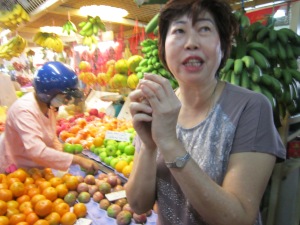Pearly Kee is the granddaughter of a Victorian Sugar tycoon. She is the daughter of his 6th. son. She has a stormy life story to tell; loss of her mother at an early age, brought up by “strict aunts”, having to pay her way from age 6, health issues and dead-end jobs have marked her life. But this Penang, Malaysia native is bright, happy and superbly knowledgeable about cooking, dietary medicine and culinary botany. She reminds me a little of that other Malaysian Chinese prodigy, James Wong. And like James, Pearly too is an evangelist. A day in Pearly’s cooking school is a breathless whirlwind of experience, information, trial, error and success.
Taxied from their quarters, her cookery school students’ day starts at the Penang wet market where Pearly starts a whistle stop tour of her favourite stalls. Taste this, notice this, look at the way she is doing this, the market is the ultimate visual aid for entry-level nyonya cookery students, who leave this first stage of the day course with a mouth full of flavour and head full of information. Tapioca root contains vitamin B18, helpful for cancer patients; Chinese market stalls are arranged in terms of how the veg is grown, not how it’s cooked. Listen up and don’t get lost – Pearly’s pearls of wisdom are coming thick and fast. We sampled steamed rice noodles flavoured with pandanus, peanut muffin, ripe small banana and sipped iced coffee.
The key phrase mentioned early in the day which smashed any expectations of a cosy, unchallenging curry cooking course was “the Chinese eat holistically”. This was a blunt declaration backed up with overwhelming evidence, one example after another, that the Chinese, for thousands of years and still now, see no difference whatsoever between medicine and cookery.
In 2012 the BBC rated the British National Health Service as the 5th. largest employer in the world with its 1.7 million staff. At 26 million employees (factoring up health staff per capita), an equivalent Chinese Health Service would dwarf the world’s top 20 biggest employees summed up together. A bureaucratic organisation bigger than most countries would probably be very hard to run and may never exist. By necessity, then, China’s people take ownership of their own well-being as they have always done. So the Chinese are not going to stop cooking their “medical cuisine”. Maybe the British should start doing so?
All this considered, Pearly’s Njonya cooking class was never going to be limited to recipe-following. This would be a journey into complex medicinal studies, the biochemistry of plants, meticulous food hygiene, diet science, and just for an encore, a trio of restaurant-grade nyonya dishes cooked by the students in Pearly’s delightful tropical herb garden using wet-market produce nibbled and sampled the same morning. Her customers never realised they were such excellent cooks. I am going to cook differently as a result of this course. I will:
